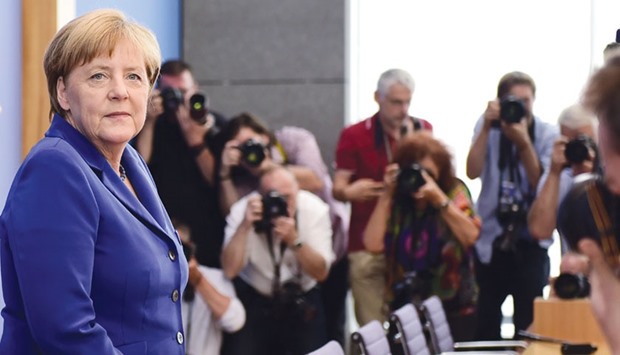Germany will remain open to refugees but will do “everything humanly possible” to ensure security, Chancellor Angela Merkel vowed yesterday, as she defended her migration policy while reassuring a country shaken by a series of attacks.
Merkel said that only by “sticking to its principles” could Germany overcome the major test it is facing after four violent attacks since July 18, three of which were committed by registered asylum-seekers.
She described the attacks as “shocking and depressing” and said that the perpetrators had mocked Germany by posing as refugees.
But her government would not rescind its offer of refuge to those fleeing war and conflict, she added.
“I am just as convinced today as I was before that we can do it – we can live up to our historical responsibility,” Merkel said, reiterating her mantra that Germany can integrate the 1.1mn refugees who arrived in the country in 2015.
She outlined a nine-point security plan, which she said includes a lower threshold for the deportation of failed asylum-seekers, an
“early warning system” for radicalisation among refugees and the deployment of soldiers in domestic counterterrorism operations.
Critics say that Germany’s Bundeswehr (the unified armed forces) is neither trained nor equipped to participate in police operations during terrorist attacks.
Merkel said that “it is now time” for soldiers to undergo the training they require to be “integrated” into the fight against terrorism.
The security plan also includes the creation of a central agency tasked with decrypting online communications for the purpose of national security and the acceleration of plans for intelligence-sharing with other countries.
The four incidents since July 18 included an axe-and-knife attack on a commuter train near Wuerzburg, a mass shooting in Munich, a knife attack in Reutlingen, and a suicide bombing in Ansbach.
“The fact that two men who came to us as refugees are responsible for the deeds in Wuerzburg and Ansbach mocks the country that took them in,” the chancellor said. “It mocks the many other refugees who truly seek our protection against violence and conflict.”
She warned against a blanket suspicion of Muslims as a result of the attacks, insisting that Germany was “not in a war or fight against Islam, but in a fight against terrorism”.
The chancellor noted that the battle against Islamic State (IS) would not take priority over the fight against other crimes such as acts of right-wing extremism, which have risen dramatically since the beginning of 2015.
The Munich shooting, in which nine people died and dozens were injured, was carried out by a German-Iranian teenager who reportedly admired Adolf Hitler and Norwegian far-right terrorist Anders Behring Breivik.
“Don’t follow those who carry hate in their hearts,” Merkel said in response to the rise in racism, xenophobia and anti-Semitism in the country.
Germany’s right-wing political upstart Alternative for Germany
(AfD) has seized on the upsurge in violence to accuse Merkel of making the country a target for terrorists.
The attacks have increased misgivings within Merkel’s own conservative political bloc – made up of her Christian Democrats and its Bavarian sister party CSU – about her promise of sanctuary to all those fleeing the civil war in Syria.
The CSU government in Bavaria, where three of the attacks took place, formulated yesterday its own counter-terrorism strategy, saying that it would hire 2,000 new police officers by 2020 and introduce tougher screening of refugees.

Merkel: I am just as convinced today as I was before that we can do it u2013 we can live up to our historical responsibility.
